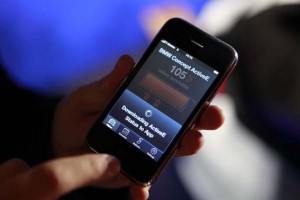
You can use that cellphone to track a lot of things in your life. But can police use it to track you?
Frustrated police were confident Washington, D.C. nightclub owner Antoine Jones was deep in the illegal drug trade, so they hid a small GPS tracking device in his Jeep that eventually led them to suburban safe house Jones used to stash drugs and cash, ultimately landing him a life sentence.
But the U.S. Supreme Court has sided with an appeals court that overturned Jones’ conviction, contending that police need a search warrant to use GPS technology to track criminal suspects. It’s one of the most significant rulings on the use of state-of-the-art technology by law enforcement, but the unusual, unanimous decision by an often fractious court leaves open a number of questions that the Supremes may yet have to deal with.
Most notably: can police legally follow the movements of a suspect using technology that can track a person’s cellphone?
“By attaching the device to the Jeep…officers encroached on a protected area,” wrote Justice Antonin Scalia, speaking for the court, which ruled the use of the device violated the Fourth Amendment to the Constitution which guards against unreasonable searches and seizures.
The basic issues of the case drew a unanimous response from the nine justices, though there was a debate over several concurrent issues, including the length of time authorities left the tracking device attached to Jones’ Jeep. Justice Samuel Alito expressed his concern over the suspect’s expectation of privacy and the fact that the GPS device remained in place for four weeks.
“The line was surely crossed,” Alito wrote in his own opinion.
The ruling, observers said, came as something of a surprise as the Supreme Court has been tolerating a number of efforts to broadly expand the power of law enforcement authorities in the wake of the 9/11 terrorist attacks.
The American Civil Liberties Union was one of those pleased by the unanimous ruling, declaring it an “important victory for privacy.”
The court has had a mixed history in recent years in interpreting precisely how much privacy is actually guaranteed by the Constitution, however, and the latest case is not expected to end the debate over how far authorities can go when using high-tech tools to track suspected criminals and terrorists.
Even the most basic cellphone can be roughly located by coordinating signals received by different towers. That would cover more than 322 million cellphones, noted Justice Alito.
More advanced smartphones typically also contain GPS devices that can be more accurately tapped for the users location – Apple, for example, allows a user of its new iCloud system to precisely locate a phone that might have been lost or stolen.
And what about a vehicle that already has a GPS tracking system installed? Or if the federal government required manufacturers to install GPS in all future vehicles?
Since police would not have to trespass by installing a tracking device, “the court’s theory (in its decision on drug dealer Jones’ appeal) would provide no protection,” Alito cautioned.
“It may be necessary to reconsider” whether simply carrying a cellphone means a citizen “has no reasonable expectation of privacy,” at least when it comes to disclosing one’s location, added the court’s newest member, Sonia Sotomayor.

I must say that I am most certainly against all the texting and cellphone talking that goes on all the time. However, I do not go along with the device to block communications. A much more stiff fine etc., should be levied against those abusing the use of cellphones and causing a great safety hazard on the road. There are/have been, times that a person needed to make a phone call and still keep driving. i.e., when being tailed/chased by someone determined to do harm to them.
Hi, William,
I have to agree. Personally, the idea that you cannot make at least a 911 call when using the device seems to be a potentially fatal flaw.
Paul A. Eisenstein
Publisher, TheDetroitBureau.com
From what I read the whole article say’s the government is able to infringe on your privacy by way’s of the gps tracking systems built into your phone or by planting a gps tracking device on your car. It has nothing to do with making phone calls, come on people read the whole article.
Hi, Mark,
Authorities have already used the capabilities of the cellphone network to track persons, both for criminal investigations and for rescue efforts — ie, when a person went missing while driving from point a to b — even if you do not actually make a call the phone will regularly communicate with the local cell towers. Meanwhile, the millions of smartphones now being marketed with GPS and other more precise tracking capabilities, ie the iPhone, greatly improve the ability to follow a user’s movements. Anyone with an iPhone can test how accurate this is by signing up for the new iCloud service, available if you upgraded to iOS5. One of its features is the ability to track the phone and display it’s location on a map. This is great if a phone is lost or stolen, and you even have the capability of locking or even wiping data off the phone. Of course, the potential for a hacker or someone else to use it for less noble purposes is significant, as well.
Paul A. Eisenstein
Publisher, TheDetroitBureau.com